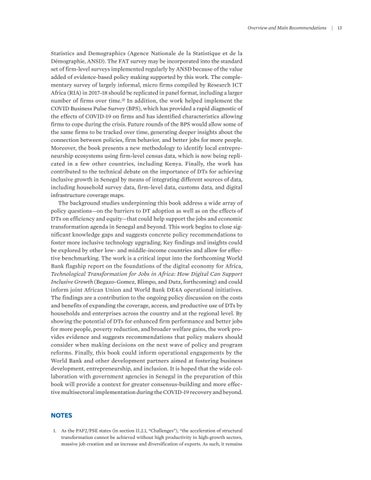Overview and Main Recommendations
Statistics and Demographics (Agence Nationale de la Statistique et de la Démographie, ANSD). The FAT survey may be incorporated into the standard set of firm-level surveys implemented regularly by ANSD because of the value added of evidence-based policy making supported by this work. The complementary survey of largely informal, micro firms compiled by Research ICT Africa (RIA) in 2017–18 should be replicated in panel format, including a larger number of firms over time.18 In addition, the work helped implement the COVID Business Pulse Survey (BPS), which has provided a rapid diagnostic of the effects of COVID-19 on firms and has identified characteristics allowing firms to cope during the crisis. Future rounds of the BPS would allow some of the same firms to be tracked over time, generating deeper insights about the connection between policies, firm behavior, and better jobs for more people. Moreover, the book presents a new methodology to identify local entrepreneurship ecosystems using firm-level census data, which is now being replicated in a few other countries, including Kenya. Finally, the work has contributed to the technical debate on the importance of DTs for achieving inclusive growth in Senegal by means of integrating different sources of data, including household survey data, firm-level data, customs data, and digital infrastructure coverage maps. The background studies underpinning this book address a wide array of policy questions—on the barriers to DT adoption as well as on the effects of DTs on efficiency and equity—that could help support the jobs and economic transformation agenda in Senegal and beyond. This work begins to close significant knowledge gaps and suggests concrete policy recommendations to foster more inclusive technology upgrading. Key findings and insights could be explored by other low- and middle-income countries and allow for effective benchmarking. The work is a critical input into the forthcoming World Bank flagship report on the foundations of the digital economy for Africa, Technological Transformation for Jobs in Africa: How Digital Can Support Inclusive Growth (Begazo-Gomez, Blimpo, and Dutz, forthcoming) and could inform joint African Union and World Bank DE4A operational initiatives. The findings are a contribution to the ongoing policy discussion on the costs and benefits of expanding the coverage, access, and productive use of DTs by households and enterprises across the country and at the regional level. By showing the potential of DTs for enhanced firm performance and better jobs for more people, poverty reduction, and broader welfare gains, the work provides evidence and suggests recommendations that policy makers should consider when making decisions on the next wave of policy and program reforms. Finally, this book could inform operational engagements by the World Bank and other development partners aimed at fostering business development, entrepreneurship, and inclusion. It is hoped that the wide collaboration with government agencies in Senegal in the preparation of this book will provide a context for greater consensus-building and more effective multisectoral implementation during the COVID-19 recovery and beyond.
NOTES 1.
As the PAP2/PSE states (in section II.2.1, “Challenges”), “the acceleration of structural transformation cannot be achieved without high productivity in high-growth sectors, massive job creation and an increase and diversification of exports. As such, it remains
|
13



